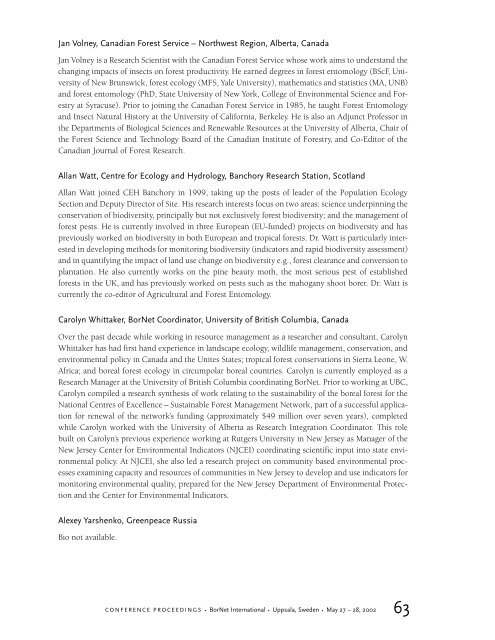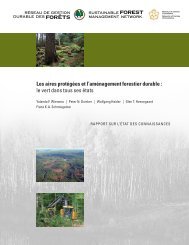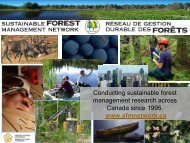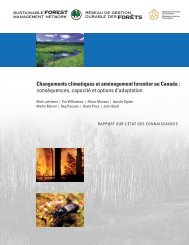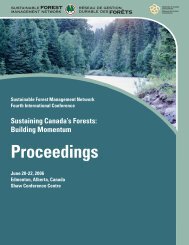Conference Proceedings - Sustainable Forest Management Network ...
Conference Proceedings - Sustainable Forest Management Network ...
Conference Proceedings - Sustainable Forest Management Network ...
Create successful ePaper yourself
Turn your PDF publications into a flip-book with our unique Google optimized e-Paper software.
Jan Volney, Canadian <strong>Forest</strong> Service – Northwest Region, Alberta, Canada<br />
Jan Volney is a Research Scientist with the Canadian <strong>Forest</strong> Service whose work aims to understand the<br />
changing impacts of insects on forest productivity. He earned degrees in forest entomology (BScF, University<br />
of New Brunswick, forest ecology (MFS, Yale University), mathematics and statistics (MA, UNB)<br />
and forest entomology (PhD, State University of New York, College of Environmental Science and <strong>Forest</strong>ry<br />
at Syracuse). Prior to joining the Canadian <strong>Forest</strong> Service in 1985, he taught <strong>Forest</strong> Entomology<br />
and Insect Natural History at the University of California, Berkeley. He is also an Adjunct Professor in<br />
the Departments of Biological Sciences and Renewable Resources at the University of Alberta, Chair of<br />
the <strong>Forest</strong> Science and Technology Board of the Canadian Institute of <strong>Forest</strong>ry, and Co-Editor of the<br />
Canadian Journal of <strong>Forest</strong> Research.<br />
Allan Watt, Centre for Ecology and Hydrology, Banchory Research Station, Scotland<br />
Allan Watt joined CEH Banchory in 1999, taking up the posts of leader of the Population Ecology<br />
Section and Deputy Director of Site. His research interests focus on two areas: science underpinning the<br />
conservation of biodiversity, principally but not exclusively forest biodiversity; and the management of<br />
forest pests. He is currently involved in three European (EU-funded) projects on biodiversity and has<br />
previously worked on biodiversity in both European and tropical forests. Dr. Watt is particularly interested<br />
in developing methods for monitoring biodiversity (indicators and rapid biodiversity assessment)<br />
and in quantifying the impact of land use change on biodiversity e.g., forest clearance and conversion to<br />
plantation. He also currently works on the pine beauty moth, the most serious pest of established<br />
forests in the UK, and has previously worked on pests such as the mahogany shoot borer. Dr. Watt is<br />
currently the co-editor of Agricultural and <strong>Forest</strong> Entomology.<br />
Carolyn Whittaker, BorNet Coordinator, University of British Columbia, Canada<br />
Over the past decade while working in resource management as a researcher and consultant, Carolyn<br />
Whittaker has had first hand experience in landscape ecology, wildlife management, conservation, and<br />
environmental policy in Canada and the Unites States; tropical forest conservations in Sierra Leone, W.<br />
Africa; and boreal forest ecology in circumpolar boreal countries. Carolyn is currently employed as a<br />
Research Manager at the University of British Columbia coordinating BorNet. Prior to working at UBC,<br />
Carolyn compiled a research synthesis of work relating to the sustainability of the boreal forest for the<br />
National Centres of Excellence – <strong>Sustainable</strong> <strong>Forest</strong> <strong>Management</strong> <strong>Network</strong>, part of a successful application<br />
for renewal of the network’s funding (approximately $49 million over seven years), completed<br />
while Carolyn worked with the University of Alberta as Research Integration Coordinator. This role<br />
built on Carolyn’s previous experience working at Rutgers University in New Jersey as Manager of the<br />
New Jersey Center for Environmental Indicators (NJCEI) coordinating scientific input into state environmental<br />
policy. At NJCEI, she also led a research project on community based environmental processes<br />
examining capacity and resources of communities in New Jersey to develop and use indicators for<br />
monitoring environmental quality, prepared for the New Jersey Department of Environmental Protection<br />
and the Center for Environmental Indicators.<br />
Alexey Yarshenko, Greenpeace Russia<br />
Bio not available.<br />
CONFERENCE PROCEEDINGS • BorNet International • Uppsala, Sweden • May 27 – 28, 2002 63


